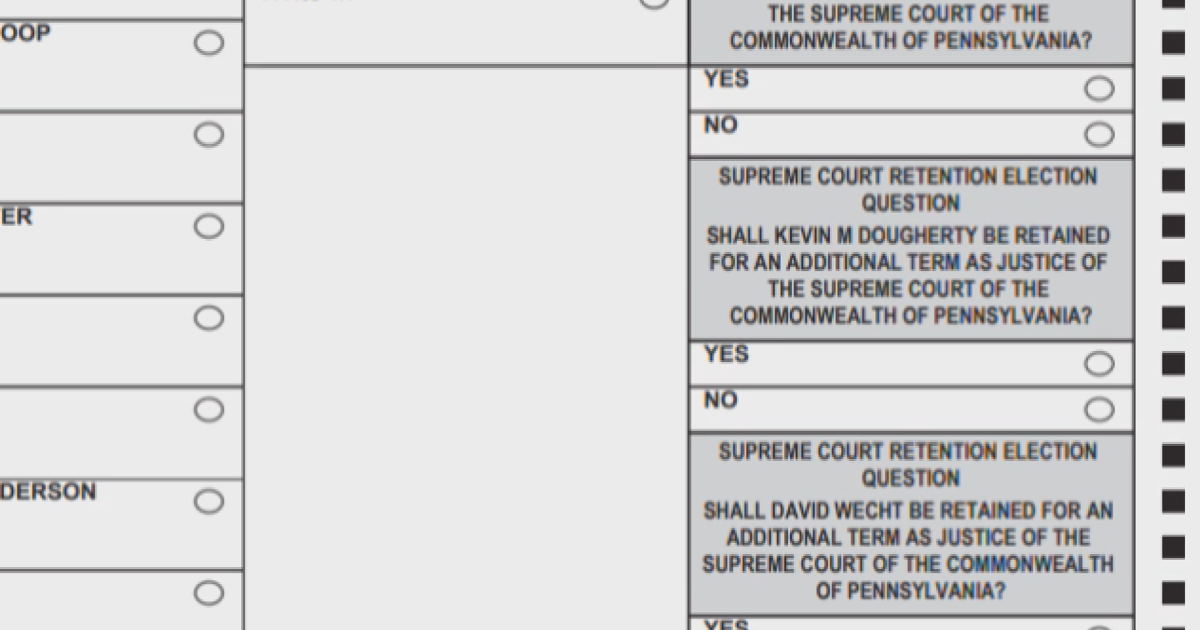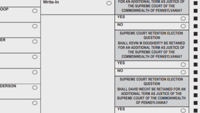John Mizner on how ballot decisions have become increasingly politicized.
If you’ve noticed that the 2025 Pennsylvania Supreme Court judicial retention vote has taken on a highly political tone, you’re not alone. Erie attorney John Mizner, a former Erie County GOP chair, has observed this shift and shared his perspective on the matter. According to Mizner, the level of political influence in these retention elections is unprecedented.
“There is no doubt that in 2025 in these retention elections you see more pure politics than you’ve ever seen before,” Mizner said.
Political Messaging on Both Sides
Voters across Pennsylvania have likely received numerous text messages and mailers urging them to vote along party lines. Democrats are being encouraged to vote “yes” to retain the three Pennsylvania Supreme Court justices, while Republicans are being urged to vote “no.” Even Pennsylvania Governor Josh Shapiro has entered the fray with political ads that Mizner characterizes as clearly partisan in nature.
“This is our Democratic team, and they’re protecting you in this branch of government,” Mizner said, summarizing the governor’s message. He noted that this approach marks a departure from the traditional pitch, which focused on the qualifications and performance of the judges. “Heretofore, the pitch was—these are good judges, they’re respected, they’ve done a good job—that’s not the pitch that the governor’s making,” he added.
A National Trend?
Mizner believes this trend of politicizing judicial retention votes is not unique to Pennsylvania. He suspects that governors in other states, whether Republican or Democrat, are also injecting more political rhetoric into what is supposed to be a nonpartisan process.
“I would suspect that a governor, whether he’s Republican or Democrat, is doing the same thing in different states—putting a much more political voice into a process that is supposed to be the one that is most free of politics,” Mizner said.
Advice for Voters: Focus on Education, Not Partisanship
So, what should voters do in the face of this increasing politicization? Mizner advises against making decisions based solely on party affiliation. Instead, he urges voters to educate themselves about the candidates and the issues at stake.
“Educate themselves on the candidates, on the issues so that they can make an informed decision on what’s best for this Commonwealth,” Mizner said. “Otherwise, they’re not doing their civic duty. And simply to check a box because it’s Republican or Democrat is not the way these elections are intended to be, and I don’t think they serve democracy if that’s the way they’re conducted.”
The Trump Effect on Judicial Elections
Mizner also pointed to former President Donald Trump’s handling of the courts as a contributing factor to the current situation. He noted that Trump’s public criticism of judges and their decisions has been unprecedented.
“Trump, unlike previous presidents, has specifically called out judges, has called out decisions, has criticized judges and decisions in ways that have never been done before, and judges have responded a little bit in ways that we’ve never seen before,” Mizner explained. “Certainly all of that is spilling over into how these retention elections are being handled.”
Local Judges Less Affected by Politicization
Despite the growing politicization of judicial retention votes at the state level, Mizner does not believe this trend will significantly impact voter decisions regarding local judges in Erie County. He attributes this to voters’ familiarity with local judges, their character, and their rulings.
“At least they have an opportunity to get a sense of what type of judicial philosophy, what types of decisions these people make, and therefore can make a much more informed decision with respect to whether these candidates or judges should be retained,” Mizner said.
How to Make an Informed Decision
To better educate yourself about the candidates, you can visit the Pennsylvania Bar Association’s website. The site provides resources such as the Bar’s recommendations and candidate questionnaires. You can access these materials here.
It’s important to note that a “yes” vote in a judicial retention election allows a judge or justice to serve another 10 years, though they must retire at age 75. If the vote is “no,” the governor can appoint a temporary replacement, but the appointment is subject to approval by the Pennsylvania Senate.


